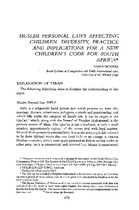| dc.contributor.author | Moosa, Najma | |
| dc.date.accessioned | 2013-06-18T13:44:16Z | |
| dc.date.available | 2013-06-18T13:44:16Z | |
| dc.date.issued | 1998 | |
| dc.identifier.citation | Moosa, N. (1998). Muslim Personal Laws affecting children: diversity, practice and implications for a new children's code for South Africa. South African Law Journal, 115(3): 479-492 | en_US |
| dc.identifier.issn | 0258-2503 | |
| dc.identifier.uri | http://hdl.handle.net/10566/648 | |
| dc.description.abstract | Introduction: Marriage is seen as an institution for, among various objects, the procreation of children. Children in Islam are ideally seen as the fruits of marriage-for mothers as homemakers to love and nurture and for fathers to provide materially, presumably without any distinction between males and females. Sons, however, are specifically perceived as part of the wealth of men. Seventh-century Qur'anic verses of this nature are not interpreted any differently today, even though the situation in society has changed. There are mothers who are unwilling or unable merely to fulfil the role of homemaker, as there are fathers who are unwilling or unable to be the sole providers for their families. Sons become men and daughters become women, and in this way the vicious cycle is perpetuated. These verses also set the scene for the rights of Muslim children and the problems that these rights hold for any legislation, including human-rights instruments, whose provisions might apply equally to children, irrespective of sex and religion. In this paper, though, it is argued that the rights of children in Islam, seen in proper perspective, can be synchronized to conform to the requirements of a new children's code in South Africa (whether in the form of a revised Child Care Act or entirely new piece of legislation) and international instruments, as indeed should be the case the world over. | en_US |
| dc.language.iso | en | en_US |
| dc.publisher | Juta Law | en_US |
| dc.rights | Copyright Juta Law. This file may be freely used provided that the source is acknowledged. No commercial distribution of this text is permitted. | |
| dc.subject | Muslim Personal Law | en_US |
| dc.subject | Children | en_US |
| dc.subject | Diversity | en_US |
| dc.title | Muslim Personal Laws affecting children: diversity, practice and implications for a new children's code for South Africa | en_US |
| dc.type | Article | en_US |
| dc.privacy.showsubmitter | false | |
| dc.status.ispeerreviewed | true | |
| dc.description.accreditation | Department of HE and Training approved list | en_US |

